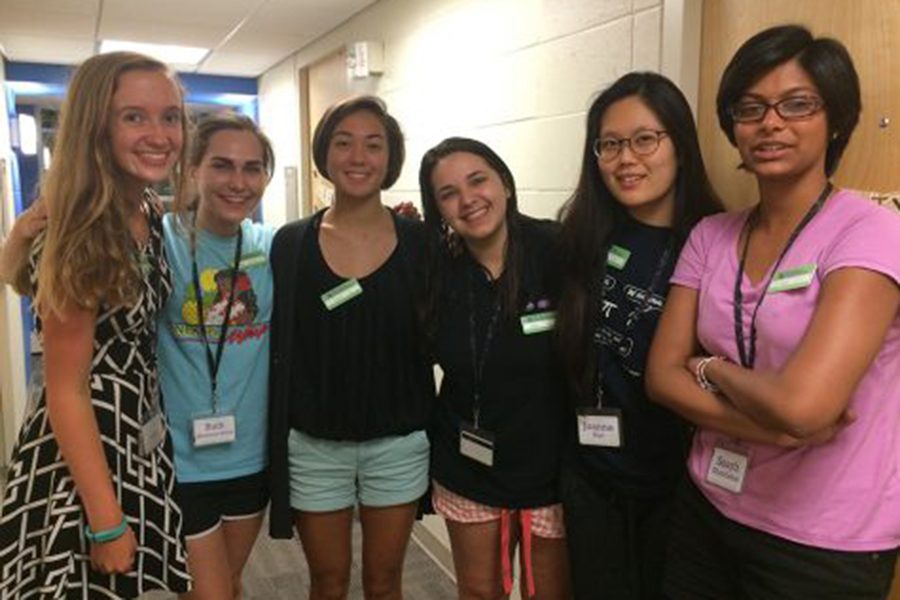Nerd Camp Changed My Life
The summer season can be filled with life-changing adventures. That experience for me was a “nerd” camp in Columbia, Missouri.
PHOTO | Meg Travis
Meg Travis and fellow scholars Ruth Scholnick-Shur, Lauren Brady, Olivia Rauls, Joanne Kim and Saayli Khambekar congregate for a photo together in their dorm hall before dispersing for an afternoon activity June 19.
All throughout grade school and even in high school, I’ve been pegged as the “smart kid” and oftentimes nothing more. I frequently felt insignificant beyond the grades that I received. It seemed that my worth as an individual relied on my school performance. I felt isolated and simply not good enough.
This point of view had been fostered in my mind for 16 years. But I knew that was just the surface reality of who I was. And in June, the Missouri Scholars Academy changed my perspective in just three short weeks.
I was first approached about MSA by counselor Nancy Stevens, based off the results of my PSAT exam. The application process consisted of essays and an IQ test, and news of acceptance wasn’t heard until that May.
On my way to Columbia, Missouri that June day, the core of MSA’s mission was still a mystery. My biggest fear was that I wouldn’t be able to associate and connect with my peers and that I wouldn’t find a place among the 325 other teenagers. Junior Moriana Jaco, the other Sion student participating in MSA, had similar trepidations.
“One main fear was that I wasn’t going to be as smart as a lot of the students going to MSA,” Jaco said. “I was scared that this camp was going to be extremely nerdy and that I wouldn’t fit in with a lot of the people going.”
Within a week, it was clear that MSA was something different and extraordinary. Intelligence was a competition left at the door, and it was a place where uniqueness was celebrated and a community of scholars and teachers was formed.
Scholars participated in daily classes, including a 3 hour major in the morning and an hour-long minor in the afternoon. Each room was comprised of roughly 10-15 students, and class time was predominantly spent in discussion. The absence of any homework or tests alleviated stress and allowed scholars to learn for the sake of learning and expand their minds in critical thinking and questioning.
“MSA had almost no resemblance to a conventional classroom,” Jaco said. “The students in my major and minor dictated the lesson…we were able to share our thoughts and opinions on topics that we talked about in class.”
MSA was not just academically but also socially freeing. Each person was accepted for who they were and not for their grades. MSA was an opportunity to branch out of comfort zones, try new things and find commonalities with each other through digging past prejudices.
“[Because of MSA], I’m now less judgmental and more interested in getting to know people,” Jaco said. “I was great friends with people who don’t run in my normal friend circles and it made me realize that I have a lot in common with many people…everyone has at least one thing in common.”
In less than a month, MSA had succeeded in opening my eyes to a new understanding of worth. It is not intellect that defines me as a person, it is how I act towards others and how I carry myself. The worth of a human being is multi-faceted and and it is through the acknowledgement and embracement of those qualities in myself and others that I came to see myself as more than just “the smart kid.”



